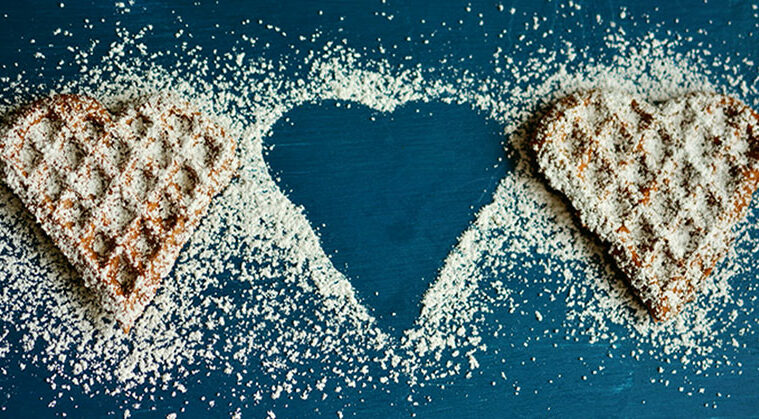We all know how hard it can be to cut sugar out of our diets. However, when we’re looking at doing a sugar detox or a no sugar diet we are committing ourselves to ditching sugar. Completely. Why is quitting sugar so hard? The answer is that we go through sugar withdrawal when we stop eating sugar altogether.
What is sugar withdrawal? Sugar withdrawal symptoms are the negative feelings you experience when you stop eating sugar. Going through sugar withdrawal can be uncomfortable. The reason you go through sugar withdrawal is that sugar is addictive. Just like any other drug, when you try to get off of sugar, your body is going to react to the absence of the substance. (1)
Sugar withdrawal can cause you a lot of pain and discomfort just like withdrawals from drugs. To avoid sugar withdrawal we have a few tips and tricks. Sugar withdrawals are something you might go through when you first embark on a sugar detox. However, you might also experience sugar withdrawals if you consume extreme amounts of sugar and you suddenly try to decrease your intake even slightly.
When you are going through sugar withdrawal it can be painful. But it is important to remember that this is only temporary pain. Sugar withdrawal is a symptom of sugar addiction which is something we all absolutely need to address. There are ways to try to avoid sugar withdrawal. However, it should be generally accepted as a part of breaking our addiction to sugar.
The Symptoms of Sugar Withdrawal
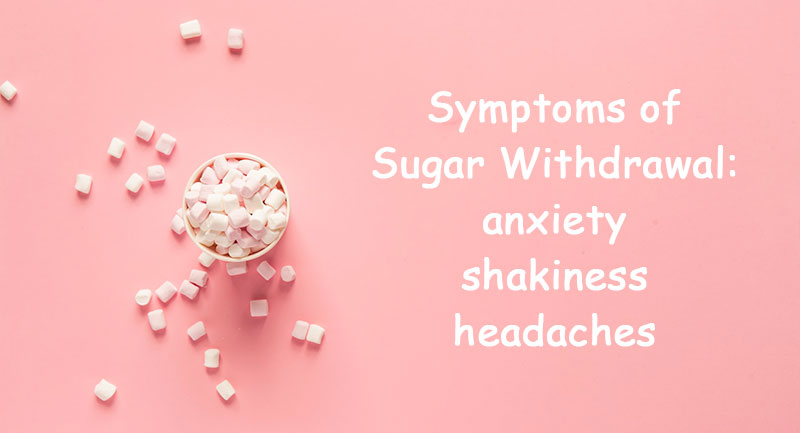
There have been studies on the effects of sugar withdrawal. When rats who have been binge eating sugar are deprived from it or given an opiate blocking drug they start to have withdrawal symptoms similar to opiates. The report showed the rats had “anxiety, teeth chattering, forepaw tremor, [and] head shakes” when they took their sugar away. They did the same study with Saccharin, also known as the artificial sweetener Sweet N’ Low, and they found similar results. (2)
What we learn from rats, we can easily extend to our own bodies. When we stop eating sugar, we put ourselves at risk of withdrawal symptoms very similar to that of a recovering opiate addict. Stopping your sugar addiction can be nearly as daunting of a challenge.
Being physically addicted to a substance is a horrible feeling. When we become addicted to sugar it means that when we consume it we are simply satiating a craving and a desire. In other words, instead of enjoying sugar we are simply mitigating the negative effects of our withdrawal by continuing to consume sugar.
Our mental and physical health can be impacted immensely by sugar withdrawal. Just like rats, we may end up having anxiety, depression, and dysphoria. In addition to our emotional and mental well being we may see some physical effects too. Shaking, trembling, teeth chattering, or anything else you might expect to see from a drug withdrawal can and will occur during a sugar withdrawal.
How to Avoid Sugar Withdrawal
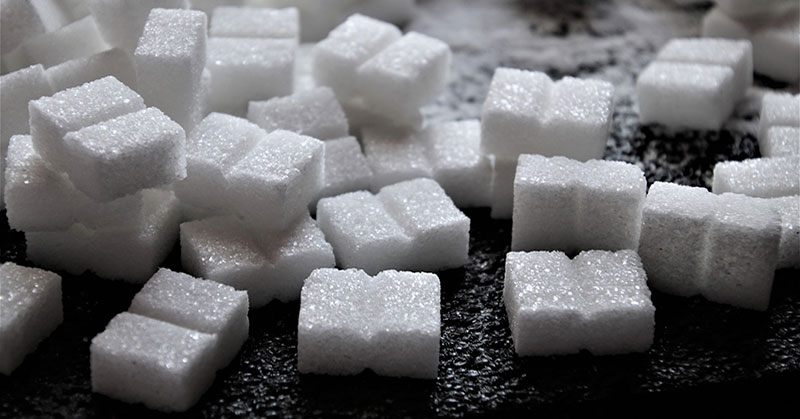
Avoiding sugar withdrawal altogether is a difficult process. First of all, many people recommend a sugar detox to reduce the length of withdrawals. A sugar detox is an intense form of a no sugar diet. The sugar detox reduces the amount of sugar you take in to almost nothing. This makes your withdrawal symptoms shorter because you are going ‘cold turkey’ and getting all of the sugar out of your system quickly.
The benefits of a sugar detox are vast. Not only are you doing an intense sugar cleanse you are breaking your addiction to sugar in the fastest way possible. Many people recommend this method because although the withdrawal symptoms may be intense they will last a shorter amount of time.
If you are less concerned about the length of the withdrawals and you’re more concerned about the intensity, you can try a no sugar diet. A no sugar diet is a less intense version of the sugar detox. A sugar detox makes you eliminate all high glycemic load foods from your diet. On the other hand, a simple no sugar diet asks you to just remove added sugars from your diet.
Doing a no sugar diet can be a lot easier for many of us. Your sugar withdrawal symptoms may be intense when you try to do a full sugar detox. However, you should feel fewer symptoms when you do a no sugar diet.
Why is that? Well, the no sugar diet is easier to follow too and better for people who might have a serious addiction to carbs and refined flours which need to be eliminated on a sugar detox.
Finally, one of the best ways to avoid the symptoms of withdrawal is to never be hungry!
It sounds silly, but it’s simple! Keep yourself full with tasty protein and healthy fruits and vegetables. Never let yourself get too hungry because this is when the cravings are the worst. Replace that sugar you might be craving with high protein foods or healthy greens.
Did You Know: You May Not Be Craving Sugar – It Could Be Your Parasites!
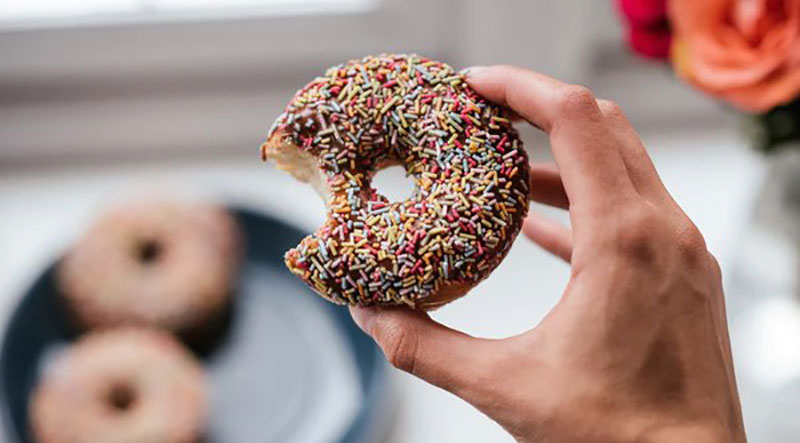
You may not even really have a sugar addiction problem after all. Many of us feel that sugar is something we continuously crave and there is no way we’ll ever be free of it. However, what you may not know, is that you could have parasites in your gut right now making you want that sugar. Parasites can live in all of us and if you’re not careful they can take over and start making a home for themselves in your own gut.
What can you do about parasites making you want to eat sugar? It can be extremely difficult to do on your own. Parasites make you feel sick and they can be difficult to get rid of. As a simple first step, you may want to look into doing a parasite cleanse.
Why Sugar Withdrawal is Worth It
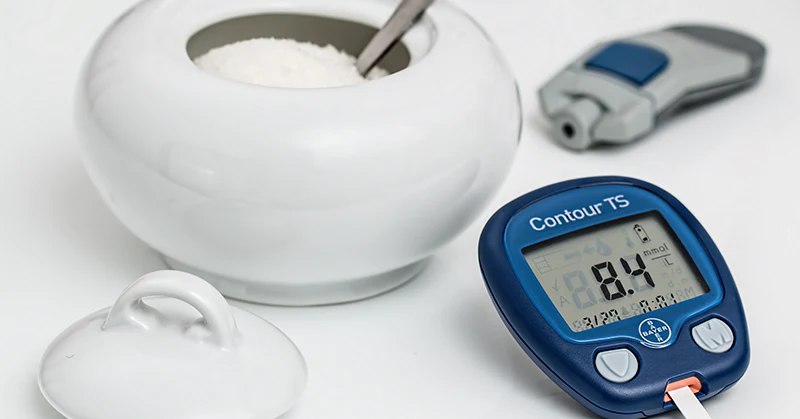
You may be asking yourself, “Why do I want to stop eating sugar if I’m going to have withdrawal symptoms?” Well, there’s a simple answer to that question: your sugar addiction is killing you. When you are addicted to sugar and eating too much of it there are a lot of health complications.
We all know that eating too much sugar can lead to things like weight gain and obesity. However, you might not have realized that your sugary diet can contribute to type 2 diabetes. Type 2 diabetes occurs when your body starts to build a resistance to insulin. You build this resistance because your body produces too much insulin due to your increased sugar intake. (3)
So if you want to extend your life and avoid long term health issues, you need to break your sugar addiction no matter how difficult it might be.
Conclusion
If you want to have sugar withdrawal symptoms for a shorter period of time you should go with a sugar detox. Doing a sugar detox is the way to go if you prefer to go cold turkey. Going cold turkey helps you break your sugar habit quickly once and for all. On the other hand you have what is called a no sugar diet. A no sugar diet may decrease the intensity of your cravings and make it easier to stick to. However, a no sugar diet instead of a straight sugar detox might increase the length of your withdrawal symptoms.
No matter which way you go about breaking your addiction to sugar just remember that it is worth it. Once you are through your withdrawal period you will be amazed at how good you’re feeling. The negative impacts of your sugar addiction can be a thing of the past once you adopt a no sugar diet or complete a sugar detox.
Sugar detoxes or no sugar diets do not have to be hard. We can help you with both and if that isn’t enough you should consider the possibility of a parasite. When you have a parasite you may crave sugar uncontrollably. If so, we recommend a parasite cleanse. Either way, detoxifying your body from sugar is a worthwhile endeavor.


